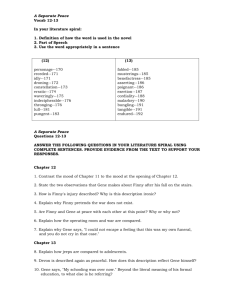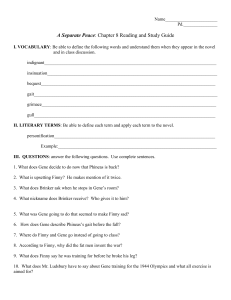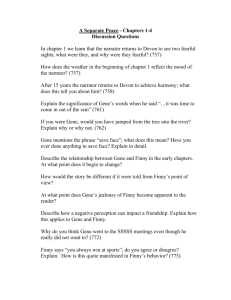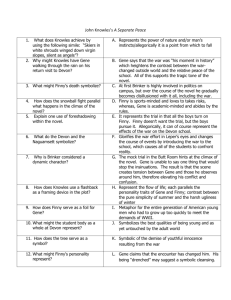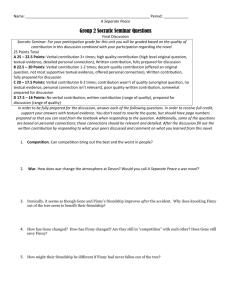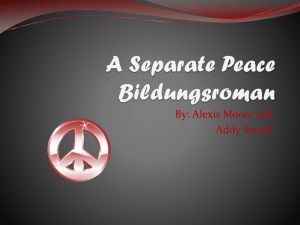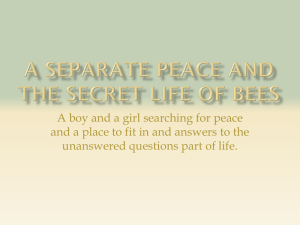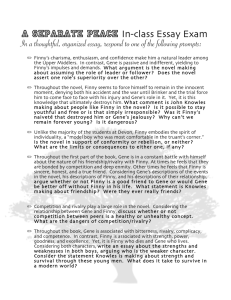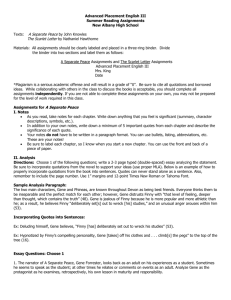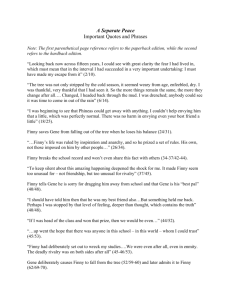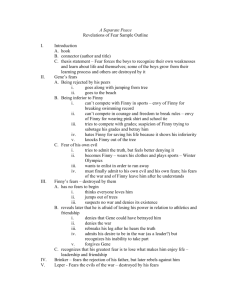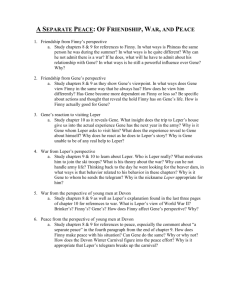A Separate Peace Study Guide: Chapters 1-10
advertisement
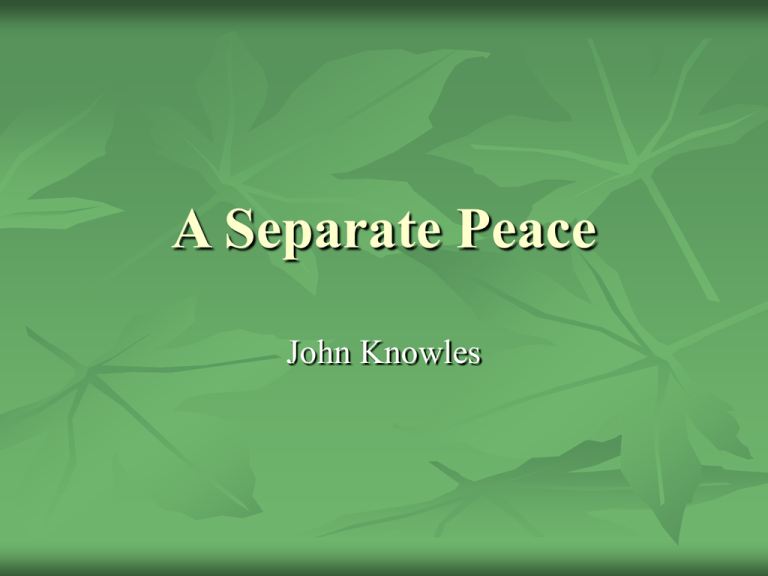
A Separate Peace John Knowles Chapter 1 and 2 In chapter one, Gene realizes he has “escaped” something since he has left Devon. What is it? Chapter 1 and 2 In paragraph 9 of chapter 2, Gene explains why the school atmosphere is more relaxed for the sixteen-year olds than it is for the seniors. What reasons does he see for the difference? Chapter 1 and 2 What connection did Finny make between jumping from the tree and the war? Chapter 1 and 2 What is the Super Suicide Society of the Summer Session? What is significant about its title? Chapters 3 and 4 In chapter 3 there is a break after which the narrator talks about a moment in history that for him represents reality. What is this time? Who are its leaders? What are some of the characteristics of the situation? What is unique about this passage? Chapters 3 and 4 “To keep silent about this amazing happening deepened the shock for me. It made Finny seem too unusual for– not friendship, but too unusual for rivalry. And there were few relationships among us at Devon not based on rivalry.“ -Ch. 3, p. 45 Chapters 3 and 4 “ I should have told him then that he was my best friend also and rounded off what he had said. I started to; I nearly did. But something held me back. Perhaps I was stopped by that level of feeling, deeper than thought, which contains the truth.” Ch. 3, p. 48 Chapters 3 and 4 “The beach shed its deadness and became spectral gray-white, then more white than gray, and finally it was totally white and stainless, as pure as the shores of Eden. Phineas, still asleep… made me think of Lazarus, brought back to life by the touch of God.” Ch. 4, p.50 Chapters 3 and 4 “The thought was, You and Phineas are even already. You are even in enmity. You are both coldly driving ahead for yourselves alone. You did hate him for breaking that school swimming record, but so what? He hated you for getting an A in every course but one last term. You would have had an A in that one except for him. Except for him.” Ch. 4, p.53 Chapters 3 and 4 “It wasn’t my neck but my understanding which was menaced. [Finny] had never been jealous of me for a second. Now I knew that there was never was and never could be any rivalry between us. I was not the same quality as he.” Ch. 4 p. 59 Chapter 5 What are some examples of allusions so far in A Separate Peace. Explain your answer. Chapter 5 What are some examples from the text of foreshadowing. What indications did the text give that hinted at Finny’s fall? Chapter 6 Back at Devon, Gene must attend the opening chapel service. There he makes the following observation: “If you broke the rules, then they broke you. That, I think, was the real point of the sermon on the first morning.” Chapter 6 What statements in chapter 6 show that Gene’s identity is now blurring into an association with Finny’s identity? Why does Gene feel and act like Finny? What are the emotions behind this behavior? Chapter 6 After applying for crew manager, he adds, “Jobs like mine were usually taken by boys with some physical disability, since everyone had to take part in sports and this was all disabled boys could do. As I walked toward the door I supposed that Quakenbush was studying me to see if he could detect a limp. But I knew that his flat black eyes would never detect my trouble.” Chapter 6 When Quakenbush taunts him with being maimed, Gene hits him and then explains, “I didn’t know why for an instant; it was almost as though I were maimed. Then the realization that there was someone who was flashed over me.” Chapter 6 Toward the end of chapter 6, Gene sums up his feelings about athletic participation: “I wanted no more of sports. They were barred from me, as though when Dr. Stanpoole said, ‘Sports are finished!’ he had been speaking of me.” Chapter 6 Gene says, “I lost part of myself to him then, and a soaring sense of freedom revealed that this must have been my purpose from the first: to become a part of Phineas.” Chapter 6 What are some symbols that have appeared in chapter 6 that reflect the change (or loss of innocence) that occurred between the Summer and Winter sessions? What else do they represent? Give examples. Chapter 6 “To enlist. To slam the door impulsively on the past, to shed everything down to my last bit of clothing, to break the pattern of life- that complex design I had been weaving since birth with all its dark threads, its unexplainable symbols set against a conventional background of domestic white and schoolboy blue, all those tangled strands which required the dexterity of a virtuoso to keep flowing- I yearned to take giant military shears to it, snap! Bitten off in an instant, and nothing left in my hands but spools of khaki which could weave only a plain, flat khaki design, however twisted they might be.” What is Gene talking about here? Explain… Chapter 7-8 1) Early in chapter 7, Brinker accuses Gene of deliberately getting rid of Finny so he could have the room all to himself. He says that Gene committed “fratricide.” What do you think this word means? 2) How did Gene react to this statement? Chapter 7-8 Gene admits that war will be deadly, but adds, “There was always something deadly lurking in anything I wanted, anything I loved. And if it wasn’t there, as for example with Phineas, then I put it there myself.” 3) What is Gene saying here? Why is this significant to understanding his personality and his guilt? Chapter 7-8 4) In what ways is Phineas the same person he was during the summer? In what ways has he changed? Give examples. 5) How would you characterize Gene and Finny’s relationship since Finny’s fall? Are they more or less dependent on one another? Are they better or lesser friends? Explain. Chapters 9-10 “…for on this day even the schoolboy egotism of Devon was conjured away…it wasn’t the cider which made me surpass myself, it was the liberation we had torn from the grey encroachments of 1943, the escape we had concocted, this afternoon of momentary, illusory, special and separate peace.” 1) Examine the imagery and word choice in this passage. What is the tone? Give examples. 2) How does this quotation help explain the title of the book? What do you think it means? Chapters 9-10 “You always were a savage underneath. I always knew that only I never admitted it. But in the last few weeks…I admitted a hell of a lot to myself…It’s you we happen to be talking about now. Like a savage underneath…like that time you knocked Finny out of the tree…Like the time you crippled him for life.” 3) What is the meaning and significance of this passage? Who is “you”? Who is “I”? What is it saying? Explain. Chapters 9-10 As Finny returns to Devon, Gene states, “peace had come back to Devon for me.” 4) Discuss Finny as a symbol of peace. Does he represent peace just for Gene or is there a wider interpretation? Explain and give examples from the book. 5) The opposite of peace is, of course, war. How does the author play these two forces against each other? Can either force be successfully denied or embraced? Why? (Think outside the box for this one… you can do it!! )
